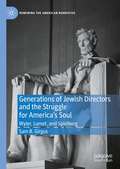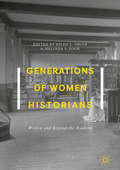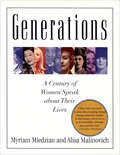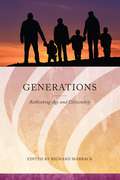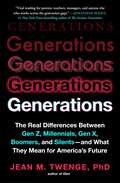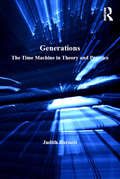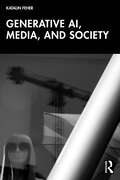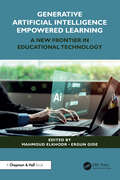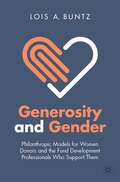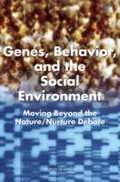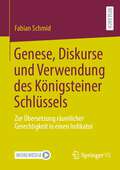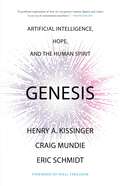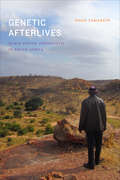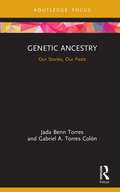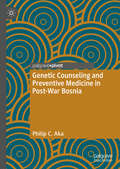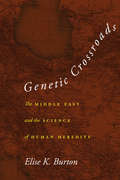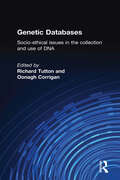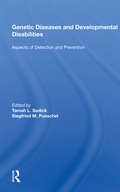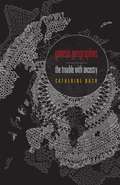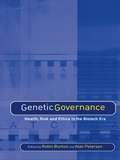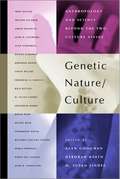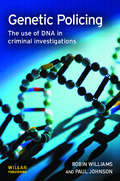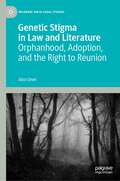- Table View
- List View
Generations of Jewish Directors and the Struggle for America’s Soul: Wyler, Lumet, and Spielberg (Renewing the American Narrative)
by Sam B. GirgusFrom generation to generation, three outstanding American Jewish directors—William Wyler, Sidney Lumet, and Steven Spielberg--advance a tradition of Jewish writers, artists, and leaders who propagate the ethical basis of the American Idea and Creed. They strive to renew the American spirit by insisting that America must live up to its values and ideals. These directors accentuate the ethical responsibility for the other as a basis of the American soul and a source for strengthening American liberal democracy. In the manner of the jeremiad, their films challenge America to achieve a liberal democratic culture for all people by becoming more inclusive and by modernizing the American Idea. Following an introduction that relates aspects of modern ethical thought to the search for America’s soul, the book divides into three sections. The Wyler section focuses on the director’s social vision of a changing America. The Lumet section views his films as dramatizing Lumet’s dynamic and aggressive social and ethical conscience. The Spielberg section tracks his films as a movement toward American redemption and renewal that aspires to realize Lincoln’s vision of America as the hope of the world. The directors, among many others, perpetuate a “New Covenant” that advocates change and renewal in the American experience.
Generations of Women Historians: Within and Beyond the Academy
by Melinda S. Zook Hilda L. SmithThis collection focuses on generations of early women historians, seeking to identify the intellectual milieu and professional realities that framed their lives. It moves beyond treating them as simply individuals and looks to the social and intellectual forces that encouraged them to study history and, at the same time, would often limit the reach and define the nature of their study. This collection of essays speaks to female practitioners of history over the past four centuries that published original histories, some within a university setting and some outside. By analysing the values these early women scholars faced, readers can understand the broader social values that led women historians to exist as a unit apart from the career path of their male colleagues.
Generations: A Century of Women Speak about Their Lives
by Myriam Miedzian Alisa MalinovichWhat are the differences in how your grandmother, your mother, and your daughter experience the world? Compare the story of your grandmother’s first date with you mother’s, your mother’s volunteer work with your own career, your great-grandmother’s education and expectations with those of a teen today. The women in this landmark work of oral history are from diverse ethnic, geographic, and social backgrounds, and they tell stories about all aspects of their lives, from their professional and romantic experiences to sex discrimination and their own realized or unrealized aspirations. The result is a dynamic and captivating portrait that all women will find themselves in, and a work which will stand as one of the lasting documents of century that very well may be remembered as the Women’s Century.In recent decades volumes have been written on women’s history and the effects the feminist movement has had on American culture. But something is missing from these accounts: how the reality and day-to-day texture of women’s lives-whether or not they ever considered themselves "feminists”-have been transformed over the course of the twentieth century. As in the best oral history, the stories these women candidly tell are vivid and often poignantly detailed. We hear accounts of rural, chore-filled childhoods at the beginning of the century, of contemporary teens without curfews, of dates that began with a chat with father in the parlor, of the sexual liberation of the 1960s, of women who worked in factories during World War II, of those who were pioneers in their professions, and of women who today struggle heroically to balance the demands of marriage or single mothering, work, and children.Sweeping in scope, and yet rooted in the details, emotions, and dilemmas of everyday life, the journey women have traveled over the century here becomes all the more dramatic, the transformation they have undergone all the more remarkable. Generations is a celebration of this transformation in all its complexity, an embracing and vibrant family scrapbook that belongs to all American women.
Generations: Rethinking Age and Citizenship (Series in Citizenship Studies)
by Richard MarbackThe meaning of citizenship and the way that it is expressed by an individual varies with age, develops over time, and is often learned by interacting with members of other generations. In Generations: Rethinking Age and Citizenship, editor Richard Marback presents contributions that explore this temporal dimension of membership in political communities through a variety of rich disciplinary perspectives. While the role of human time and temporality receive less attention in the interdisciplinary study of citizenship than do spatial dynamics of location and movement, Generations demonstrates that these factors are central to a full understanding of citizenship issues. Essays in Generations are organized into four sections: Age, Cohort, and Generation; Young Age, Globalization, Migration; Generational Disparities and the Clash of Cultures; and Later Life, Civic Engagement, Disenfranchisement. Contributors visit a range of geographic locations--including the U.S., U.K., Europe, and Africa--and consider the experiences of citizens who are native born, immigrant, and repatriated, in time periods that range from the nineteenth century to the present. Taken together, the diverse contributions in this volume illustrate the ways in which personal experiences of community membership change as we age, and also explore how experiences of civic engagement can and do change from one generation to the next. Teachers and students of citizenship studies, cultural studies, gerontology, sociology, and political science will enjoy this thought-provoking look at age, aging, and generational differences in relation to the concept and experience of citizenship.
Generations: The Real Differences Between Gen Z, Millennials, Gen X, Boomers, and Silents—and What They Mean for America's Future
by Jean M. TwengeA groundbreaking, &“lavishly informative&” (The New York Times) portrait of the six generations that currently live in the United States and how they connect, conflict, and compete with one another—from the acclaimed author of Generation Me and iGen.Upending the conventional theory that generational differences are caused by major events, Dr. Jean Twenge analyzes data on 39 million people from robust national surveys—some going back nearly a century—to show that changes in technology are the underlying driver of each generation&’s unique makeup. In this revelatory work, Twenge outlines key shifts in attitudes and lifestyle choices that define each generation regarding gender, income, politics, race, sexuality, marriage, mental health, and much more. Surprising, engaging, and informative, Generations &“gets you thinking about how appreciating generational differences can, ironically, bring us together&” (Angela Duckworth, New York Times bestselling author). It will forever change the way you view your parents, peers, coworkers, and children, no matter which generation you call your own.
Generations: The Time Machine in Theory and Practice
by Judith BurnettGenerations: The Time Machine in Theory and Practice challenges the fragmented and diverse use of the concept of generation commonly found in the social sciences. It approaches the concept in a manner that stretches the sociological imagination away from its orientation toward the present by building the concept of the passage of time into our understanding of the social. It proposes an innovative and exciting view of the field of generations, lifting it out from life course and cohort analysis, and reconstituting the area with fresh and dynamic ways of seeing. With its unique, intellectually innovative and sustained critical study of generational work, Generations will appeal to scholars across a range of social sciences and humanities, and will be of particular interest to social theorists and anthropologists, as well as sociologists of social history, consumption, identity and culture.
Generative AI, Media, and Society
by Katalin FeherThis groundbreaking book demystifies generative AI’s transformative impact on media, socio-cultural dynamics, ethics, and policy.Defining generative AI as an evolutionary leap in the development of artificial intelligence, the author examines intricate human-machine interactions and socio-technical dynamics, advocating robust, proactive AI governance to address emerging uncertainties. The book is clearly structured into six key chapters, each exploring distinct aspects of the relationship between artificial intelligence, media, and society. The chapter on "Transformation" examines how machine behavior is reshaping our datafied society, questioning whether data is the new oil, or digital manure. "Generative AI" investigates the models and future impacts of generative AI as a co-intelligence, revisiting the Turing Test and analyzing societal-business impacts. "AI Media" explores the convergence of media and AI, highlighting robot journalism, synthetic content, and the disinformation era and discussing the trend toward high-risk optimism. "Uncertainties" addresses inherent unpredictability vs. strategic foresight, focusing on challenged business models, sustainability concerns, and emotional intelligence factors. "Ethics" analyzes generative morality and dual-use technology, covering trusted AI principles—from misuse to integrative solutions. Finally, "Policy" discusses governance, labor market impacts, the importance of human rights and power dynamics in generative AI. Each chapter also provides summaries of impact projects, reflective art, scholarly questions, and strategic takeaways—extended with a comprehensive glossary.This is an essential resource for scholars, students, policymakers, technologists, ethicists, and AI industry leaders seeking to rapidly understand and address the challenges and opportunities of generative AI and AI media in a cohesive framework.
Generative Artificial Intelligence Empowered Learning: A New Frontier in Educational Technology
by Mahmoud Elkhodr Ergun GideThis book explores the integration of Generative Artificial Intelligence (GenAI), such as ChatGPT, into educational practices and research methodologies. With the potential to transform traditional learning environments, this book addresses both the opportunities and challenges that come with leveraging GenAI for enhancing teaching and learning experiences.This comprehensive guide delves into multiple aspects of GenAI in education. It covers critical topics such as project-based learning (PBL), personalized learning through AI, AI-driven student assessment, and the role of AI in special education. Furthermore, it examines ethical considerations, the readiness of students and teachers for AI technologies, and case studies on AI’s impact on student outcomes. With insights from educators, researchers, and practitioners from around the globe, the book provides a balanced perspective on both theoretical frameworks and practical implementation of GenAI technologies.Ideal for educators, researchers, and policymakers, this book serves as a practical resource for those looking to effectively integrate AI into their pedagogical and research efforts. It is an essential reference for anyone interested in staying at the forefront of educational innovation and exploring the future possibilities of AI-empowered learning.
Generosity and Gender: Philanthropic Models for Women Donors and the Fund Development Professionals Who Support Them
by Lois A. BuntzThe social, political, and economic environment is ripe with opportunity to engage women and their philanthropy. Professionals working in the field of philanthropy want ideas, practical information, research, and guidance about how to work with women donors, how to build women’s philanthropy initiatives, and how to integrate this subset of donors into their current fund development departments. This book offers insight into the three historical waves of women’s philanthropy and provides a summary of current research and inspiring stories collected from interviews with more than 70 women philanthropists and leaders. Each chapter begins with current research, followed by interviews and examples, and ends with suggestions for fundraisers on how to implement the information into a women’s philanthropy initiative using a six-step process: Awareness, Assessment, Alignment, Action, Acknowledgement and Achievement. The last several chapters focus on lessons learned from successful programs in traditional organizational settings—healthcare, higher education, and environment—and what we have yet to learn from the new and emerging philanthropic models led by Laurene Powell Jobs, Priscilla Chan, Melinda Gates, Nancy Roob, and MacKenzie Scott. Throughout the book, themes of equity, diversity, and inclusion are evident and featured in stories and programs led by women of color and younger donors. Additionally, COVID has impacted how fundraisers work, requiring the philanthropy community to adapt and create new ways to reach women donors. The final chapter is a call to action to all women, to give bigger and bolder as the fourth wave of women’s philanthropy rises.
Genes, Behavior, and the Social Environment: Moving Beyond the Nature/Nurture Debate
by Institute of Medicine of the National AcademiesOver the past century, we have made great strides in reducing rates of disease and enhancing people&#39s general health. Public health measures such as sanitation, improved hygiene, and vaccines; reduced hazards in the workplace; new drugs and clinical procedures; and, more recently, a growing understanding of the human genome have each played a role in extending the duration and raising the quality of human life. But research conducted over the past few decades shows us that this progress, much of which was based on investigating one causative factor at a time&#8212often, through a single discipline or by a narrow range of practitioners&#8212can only go so far. Genes, Behavior, and the Social Environment examines a number of well-described gene-environment interactions, reviews the state of the science in researching such interactions, and recommends priorities not only for research itself but also for its workforce, resource, and infrastructural needs.
Genese, Diskurse und Verwendung des Königsteiner Schlüssels: Zur Übersetzung räumlicher Gerechtigkeit in einen Indikator
by Fabian SchmidDer zentrale Forschungsgegenstand dieser multimethodischen Fallstudie ist der Königsteiner Schlüssel, ein inzwischen standardmäßig verwendeter Verteilungsschlüssel zwischen den deutschen Bundesländern. Wesentliche Problemperspektive ist die Übersetzung räumlicher Gerechtigkeit in einen Indikator. Es wird argumentiert, dass Indikatoren häufig nicht unter Laborbedingungen entstehen und wirken, sondern diversen, oft nicht-intendierten Veränderungen unterliegen. Anhand historischen Materials wird die Etablierung als Standardinstrument in den Blick genommen. Der Bedeutungswandel im öffentlichen Diskurs wird durch inhaltsanalytische Auswertung eines Zeitungsartikelkorpus mit Hilfe computergestützter Topic-Modellierung gezeigt. Die Untersuchung der administrativen Verwendung als Verteilungsschlüssel für Asylbewerber erfolgt über Experteninterviews mit Entscheidern der Asylverwaltung bei der überregionalen Verteilung sowie der lokalen Unterbringung und Unterkunftsakquise.
Genesis of Symbolic Thought
by Alan BarnardSymbolic thought is what makes us human. Claude Lévi-Strauss stated that we can never know the genesis of symbolic thought, but in this powerful new study Alan Barnard argues that we can. Continuing the line of analysis initiated in Social Anthropology and Human Origins (Cambridge University Press, 2011), Genesis of Symbolic Thought applies ideas from social anthropology, old and new, to understand some of the areas also being explored in fields as diverse as archaeology, linguistics, genetics and neuroscience. Barnard aims to answer questions including: when and why did language come into being? What was the earliest religion? And what form did social organization take before humanity dispersed from the African continent? Rejecting the notion of hunter-gatherers as 'primitive', Barnard hails the great sophistication of the complex means of their linguistic and symbolic expression and places the possible origin of symbolic thought at as early as 130,000 years ago.
Genesis: Artificial Intelligence, Hope, and the Human Spirit
by Henry A. Kissinger Eric Schmidt Craig MundieIn his final book, the late Henry Kissinger joins forces with two leading technologists to mount &“a profound exploration&” (Walter Isaacson) of the epochal challenges and opportunities presented by the revolution in Artificial Intelligence: a breakthrough that dramatically empowers people in all walks of life while also raising urgent questions about the future of humanity. As it absorbs data, gains agency, and intermediates between humans and reality, AI (Artificial Intelligence) will help us to address enormous crises, from climate change to geopolitical conflicts to income inequality. It might well solve some of the greatest mysteries of our universe and elevate the human spirit to unimaginable heights. But it will also pose challenges on a scale and of an intensity that we have never seen—usurping our power of independent judgment and action, testing our relationship with the divine, and perhaps even spurring a new phase in human evolution. The last book of elder statesman Henry Kissinger, written with technologists Craig Mundie and Eric Schmidt, Genesis charts a course between blind faith and unjustified fear as it outlines an effective strategy for navigating the age of AI.
Genesis: Genesis, Faces And Masks, And Century Of The Wind (Memory of Fire #1)
by Eduardo Galeano&“An epic work of literary creation . . . There could be no greater vindication of the wonders of the lands and people of Latin America than Memory of Fire.&” —The Washington PostEduardo Galeano&’s monumental three-volume retelling of the history of the New World begins with Genesis, a vast chain of legends sweeping from the birth of creation to the era of savage colonialism. Through lyrical prose and deep understanding, Galeano (author of the celebrated Open Veins of Latin America) recounts creation myths, pre-Columbian societies, and the brutality of conquest, from the Andes to the Great Plains.Galeano&’s project to restore to history &“breath, liberty, and the word&” unfolds as a unique, powerful work of literature. This daring masterpiece sets the past free, weaving a new kind of history from mythology, silenced voices, and the clash of worlds. Genesis is the first book of the Memory of Fire trilogy, which continues with Faces and Masks and Century of the Wind.
Genetic Afterlives: Black Jewish Indigeneity in South Africa (Theory in Forms)
by Noah TamarkinIn 1997, M. E. R. Mathivha, an elder of the black Jewish Lemba people of South Africa, announced to the Lemba Cultural Association that a recent DNA study substantiated their ancestral connections to Jews. Lemba people subsequently leveraged their genetic test results to seek recognition from the post-apartheid government as indigenous Africans with rights to traditional leadership and land, retheorizing genetic ancestry in the process. In Genetic Afterlives, Noah Tamarkin illustrates how Lemba people give their own meanings to the results of DNA tests and employ them to manage competing claims of Jewish ethnic and religious identity, African indigeneity, and South African citizenship. Tamarkin turns away from genetics researchers' results that defined a single story of Lemba peoples' “true” origins and toward Lemba understandings of their own genealogy as multivalent. Guided by Lemba people’s negotiations of their belonging as diasporic Jews, South African citizens, and indigenous Africans, Tamarkin considers new ways to think about belonging that can acknowledge the importance of historical and sacred ties to land without valorizing autochthony, borders, or other technologies of exclusion.
Genetic Ancestry: Our Stories, Our Pasts (New Biological Anthropology)
by Jada Benn Torres Gabriel A. Torres ColónGenetic Ancestry focuses on the scientific nature and limitations of genetic ancestry testing. Co-authored by a genetic anthropologist and a cultural anthropologist, it examines the social, historical, and cultural dimensions of how people interpret genetic ancestry data. Utilizing examples from popular culture around the world and case studies from the Caribbean, the chapters highlight how genetic technology can sometimes bolster racial thinking and serve as tool of resistance and social justice.
Genetic Counseling and Preventive Medicine in Post-War Bosnia
by Philip C. AkaGenetic Counseling and Preventive Medicine in Post-War Bosnia offers a unique new perspective to longstanding debates on healthcare reforms in Bosnia. In this penetrating analysis, Philip C. Aka argues that twenty-five years after the ethnic war that shook Bosnia and Herzegovina to its foundations, healthcare reforms are a function of preventive medicine, defined as genetic counselling, backed by tobacco and alcohol control. At its core, the book offers a fresh examination of healthcare reforms in Bosnia set in the multidisciplinary field of bioethics, supplemented by comparative health studies, and comparative human rights. By offering an extensive list of electronically accessible literature on healthcare accessible in the public domain, Aka delivers an exemplar of research possibilities in the Information Age.
Genetic Crossroads: The Middle East and the Science of Human Heredity
by Elise K. BurtonThe Middle East plays a major role in the history of genetic science. Early in the twentieth century, technological breakthroughs in human genetics coincided with the birth of modern Middle Eastern nation-states, who proclaimed that the region's ancient history—as a cradle of civilizations and crossroads of humankind—was preserved in the bones and blood of their citizens. Using letters and publications from the 1920s to the present, Elise K. Burton follows the field expeditions and hospital surveys that scrutinized the bodies of tribal nomads and religious minorities. These studies, geneticists claim, not only detect the living descendants of biblical civilizations but also reveal the deeper past of human evolution. Genetic Crossroads is an unprecedented history of human genetics in the Middle East, from its roots in colonial anthropology and medicine to recent genome sequencing projects. It illuminates how scientists from Turkey to Yemen, Egypt to Iran, transformed genetic data into territorial claims and national origin myths. Burton shows why such nationalist appropriations of genetics are not local or temporary aberrations, but rather the enduring foundations of international scientific interest in Middle Eastern populations to this day.
Genetic Databases: Socio-Ethical Issues in the Collection and Use of DNA
by Richard Tutton Oonagh CorriganGenetic Databases offers a timely analysis of the underlying tensions, contradictions and limitations of the current regulatory frameworks for, and policy debates about, genetic databases. Drawing on original empirical research and theoretical debates in the fields of sociology, anthropology and legal studies, the contributors to this book challenge the prevailing orthodoxy of informed consent and explore the relationship between personal privacy and the public good. They also consider the multiple meanings attached to human tissue and the role of public consultations and commercial involvement in the creation and use of genetic databases. The authors argue that policy and regulatory frameworks produce a representation of participation that is often at odds with the experiences and understandings of those taking part. The findings present a serious challenge for public policy to provide mechanisms to safeguard the welfare of individuals participating in genetic databases.
Genetic Diseases And Development Disabilities: Aspects Of Detection And Prevention
by Tamah L SadickAdvances in medical genetics during the past two decades have made possible the detection and prevention of many genetic disorders and developmental disabilities. The emphasis of this book is on the application of these new developments to real-life situations. Covering homozygote newborn screening, heterozygote detection in the community, and pren
Genetic Geographies: The Trouble with Ancestry
by Catherine NashWhat might be wrong with genetic accounts of personal or shared ancestry and origins? Genetic studies are often presented as valuable ways of understanding where we come from and how people are related. In Genetic Geographies, Catherine Nash pursues their troubling implications for our perception of sexual and national, as well as racial, difference. Bringing an incisive geographical focus to bear on new genetic histories and genetic genealogy, Nash explores the making of ideas of genetic ancestry, indigeneity, and origins; the global human family; and national genetic heritage. In particular, she engages with the science, culture, and commerce of ancestry in the United States and the United Kingdom, including National Geographic&’s Genographic Project and the People of the British Isles project. Tracing the tensions and contradictions between the emphasis on human genetic similarity and shared ancestry, and the attention given to distinctive patterns of relatedness and different ancestral origins, Nash challenges the assumption that the concepts of shared ancestry are necessarily progressive. She extends this scrutiny to claims about the &“natural&” differences between the sexes and the &“nature&” of reproduction in studies of the geography of human genetic variation.Through its focus on sex, nation, and race, and its novel spatial lens, Genetic Geographies provides a timely critical guide to what happens when genetic science maps relatedness.
Genetic Governance: Health, Risk and Ethics in a Biotech Era
by Alan Petersen Robin BuntonEthical and practical issues around genetic research are of major international concern, both in academia and in the public domain. Questions concerning what interventions are possible and appropriate with the increasing amount of genetic information available, challenge our understandings of ourselves, our health and wellbeing, and the role of medical ethics, public health, surveillance and risk. However there has been little reflection on the socio-political effects of this new genetic knowledge and the changes in practice that are currently impacting on our lives.Containing contributions from key international researchers, this book examines the broader issues of genetic debates and looks at how prediction and risk assessment is being changed in the arenas of health, medicine and reproduction, bringing new insight on the dangers of surveillance, regulation and increased inequality. Developed out of the Taylor and Francis journal Critical Public Health, the book considers the implications of developments in genetics for contemporary liberal governance, as well as for the future of healthcare and public health.
Genetic Nature / Culture: Anthropology and Science Beyond the Two-Culture Divide
by Alan H. Goodman Deborah Heath M. Susan LindeeThis volume of original scholarship focuses on how anthropology is affected by and should respond to the wide range of issues associated with the culture and practice of genetics.
Genetic Policing: The Uses of DNA in Police Investigations
by Paul Johnson Robin WilliamsThis book is about the increasing significance of DNA profiling for crime investigation in modern society. It focuses on developments in the UK as the world-leader in the development and application of forensic DNA technology and in the construction of DNA databases as an essential element in the successful use of DNA for forensic purposes. The book uses data collected during the course of Wellcome Trust funded research into police uses of the UK National DNA Database (NDNAD) to describe the relationship between scientific knowledge and police investigations. It is illustrated throughout by reference to some of the major UK criminal cases in which DNA evidence has been presented and contested.
Genetic Stigma in Law and Literature: Orphanhood, Adoption, and the Right to Reunion (Palgrave Socio-Legal Studies)
by Alice DiverThis book critically analyses the way in which traditional sociocultural and legal biases might be perpetuated against those with unknown – or unknowable – genetic ancestries. It looks to law and works of literature across differing eras and genres focussing upon such concepts as inherited stigma, illegitimacy, orphanisation, adoption, othering, reunion, and the ‘right’ to access truths that relate to one’s original identity. Law’s role in such matters is often limited (or usurped) by custom, practice, or lingering superstitious beliefs; the importance of oral and written testimony is therefore highlighted. Characters include abandoned or orphaned figures from folk and fairy tales, Romantic and Victorian monsters and heroes, Dickensian waifs, Edwardian rescue orphans, and dystopia-set ‘rebels.‘ Their insights and experiences are mirrored in various present day scenarios that speak to familial human rights abuses, not least forced adoptions and bars on accessing original information. This cross-disciplinary book drawing on Law, Literature, Sociology, Critical Adoption Studies should be of interest to those interested in and those who have been affected in some way by adoption, origin deprivation, or reunion.
